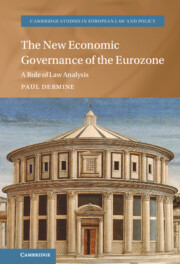Book contents
- The New Economic Governance of the Eurozone
- Cambridge Studies in European Law and Policy
- The New Economic Governance of the Eurozone
- Copyright page
- Dedication
- Contents
- Series Editors’ Preface
- Foreword by the Supervisors
- Acknowledgments
- Table of Cases
- Abbreviations
- Introduction
- Part I The New Economic Governance of the Eurozone
- 1 The New Economic Governance of the Eurozone
- 2 Postcrisis Economic Policy Coordination in the Eurozone: A Conceptual Appraisal from the Governance Perspective
- Part II The New Economic Governance of the Eurozone: A Rule of Law Analysis
- Bibliography
- Index
2 - Postcrisis Economic Policy Coordination in the Eurozone: A Conceptual Appraisal from the Governance Perspective
from Part I - The New Economic Governance of the Eurozone
Published online by Cambridge University Press: 14 July 2022
- The New Economic Governance of the Eurozone
- Cambridge Studies in European Law and Policy
- The New Economic Governance of the Eurozone
- Copyright page
- Dedication
- Contents
- Series Editors’ Preface
- Foreword by the Supervisors
- Acknowledgments
- Table of Cases
- Abbreviations
- Introduction
- Part I The New Economic Governance of the Eurozone
- 1 The New Economic Governance of the Eurozone
- 2 Postcrisis Economic Policy Coordination in the Eurozone: A Conceptual Appraisal from the Governance Perspective
- Part II The New Economic Governance of the Eurozone: A Rule of Law Analysis
- Bibliography
- Index
Summary
Chapter 2 makes sense of the many reforms passed in the field of economic and fiscal policy over the past decade by conceptualizing them from a governance perspective. Its focus is on the institutional dynamics under the economic pillar and integration techniques mobilized by policy actors. It recalls the centrality of "policy coordination" and finds that in the precrisis era economic coordination was rather loose, horizontal and state-centered, primarily geared towards the pursuit of collective policy goals. It then shows that the Eurocrisis and the COVID-19 crisis have brought the EU and its Member States to largely transcend and reshape this precrisis coordination pattern, leading to its evolution towards a new form of coordination and type of EU intervention in the field of economic policy. This pattern presents the following features. It is more centralized and vertical; no longer confines the Union to a processual role but enables it to meaningfully weigh in on the substance of the policies being coordinated; and is increasingly harmonizing, moving away from the experimentalist philosophy, as it primarily aims at ordering national policies in the economic and social field along the lines of a uniform model.
Keywords
- Type
- Chapter
- Information
- The New Economic Governance of the EurozoneA Rule of Law Analysis, pp. 96 - 142Publisher: Cambridge University PressPrint publication year: 2022



